Origin 2020: Eligibility rules must be changed to allow players to represent state of their birth
Luke Keary was born in Queensland and lived in the Sunshine State for the first 10 years of his life. He is as Ipswich as Kevin Walters and Allan Langer. Let him play for the Maroons, says PETER BADEL.
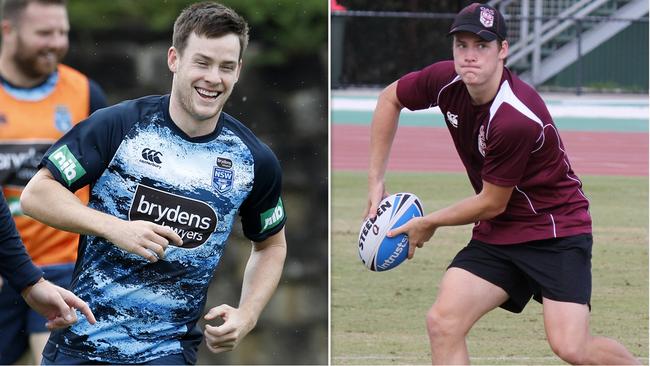
Maroons
Don't miss out on the headlines from Maroons. Followed categories will be added to My News.
ARL Commission boss Peter V’landys has proven himself to be an outstanding leader who makes swift, decisive calls.
Today, V’landys must order an immediate investigation into the farcical State of Origin rules that will see Queenslander Luke Keary make his debut for NSW in the series opener next Wednesday night.
I accept creating representative eligibility laws can be complex, and, granted, there is no perfect system, but there must be a system that allows birthplace to be a decisive factor in dual-eligibility situations.
Catch Fox League’s grand final reviews and replays on Kayo. New to Kayo? Get your 14-day free trial & start streaming instantly >
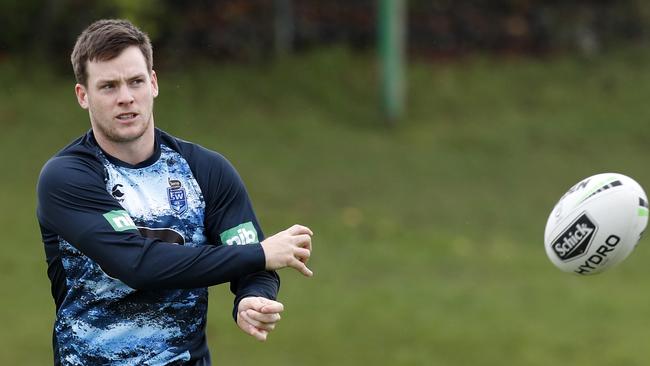
Keary is the perfect case in point.
Under the current rules, Keary technically qualifies for NSW, but he should not be forced to play for the Blues, as has happened, if his birthplace makes him a genuine candidate to play for Queensland.
What kind of flawed system decrees that a person born in a particular state cannot represent that state in his chosen sport?
When assessing Keary’s Origin eligibility, consider this.
Imagine an athlete born in Canada being told he cannot represent Canada at the Olympics because he spent part of his life in Japan.
It’s nonsense.
In the Olympic movement, birthplace ALWAYS counts. Under World Athletics rules, for example, birthplace is an instant qualification to represent a country.
If a Japanese athlete wishes to represent Australia, he or she must have lived in Australia for at least three years, thus qualifying under residency rules.
But in rugby league, NRL authorities have constructed rules blocking Keary from representing his state of birth.
Like seemingly everything in rugby league, it defies logic.
Keary was born in Queensland and lived in the Sunshine State for the first 10 years of his life. He is as Ipswich as Kevin Walters and Allan Langer. He was so keen to play for Queensland he wrote a letter to NRL CEO Dave Smith in 2014 asking to be a Maroon.
Smith rejected Keary’s application.
Keary is now too smart to rock the political Origin boat. But if he is honest, he will admit his preference is to play for Queensland.
Rugby league should never again allow the type of bungle involving Greg Inglis, a NSW-born player who chose Queensland on a whim, despite no genuine case for Maroons eligibility.
MORE ORIGIN NEWS:
But no selection system should attempt to stop a player’s link to his identity, where he was born, and how he feels.
If Keary was born in Queensland, and qualifies as a Queenslander – by birthright – he should have every right to wear Maroon.
Exclusive: Proof Luke Keary is a Maroon
Peter Badel and Travis Meyn
This is the photo of NSW hopeful Luke Keary — in Queensland colours — that exposes State of Origin’s eligibility rules as a farce.
The Queensland Rugby League has called for an urgent overhaul of Origin’s controversial eligibility rules following revelations they helped write a letter to the NRL for Keary to be declared a Maroon.
Keary is as Ipswich as Allan Langer and Kevin Walters, but Origin’s eligibility laws are so poorly constructed the Queensland-born playmaker is poised to make his debut for NSW in the series opener at Adelaide Oval this Wednesday night.
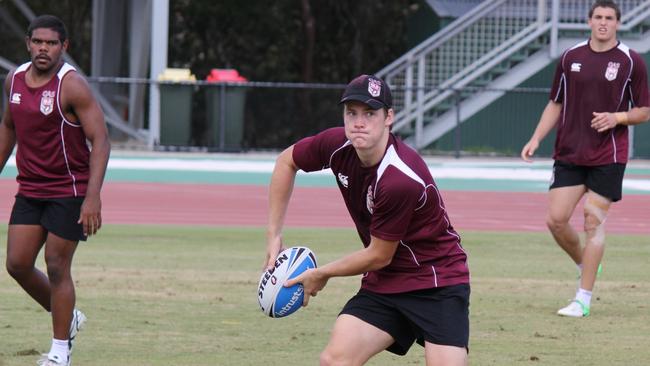
The 28-year-old Keary is set to run out in the NSW No.6 jumper — six years after he begged former NRL head-of-football Todd Greenberg to be ruled a Queenslander.
Adding to the eligibility debacle, Keary was named in Queensland’s junior Emerging Origin squad in 2012.
The Courier-Mail has obtained the above image of Keary training in Maroons colours in the Queensland Academy of Sport program set up by current Queensland coach Wayne Bennett.
The QRL has confirmed it helped Keary in his quest to be a Maroon, only to be rejected by the NRL, in State of Origin’s biggest selection saga since Kempsey-born Greg Inglis defected from NSW to play for Queensland in 2006.
“Luke made a formal application to the NRL to be chosen for Queensland,” a QRL spokesman said.
“Luke initially wrote a letter himself and with the help of the QRL and the Rugby League Players Association, the letter was finalised and sent to the NRL for consideration.
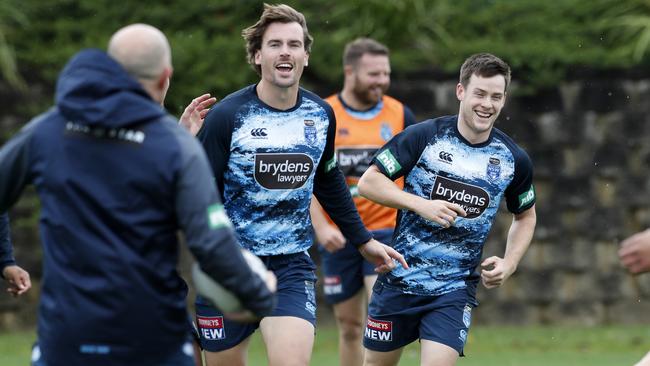
“Luke also spoke to Todd Greenberg (then NRL head of football) but unfortunately his request to play for Queensland was denied.”
Under the NRL’s representative eligibility rules, revised in December 2012, Keary technically qualifies for NSW.
But his selection in the Blues squad raises questions about the NRL’s Origin rules — and whether birthright should be a trump-card when players of dual eligibility, such as Keary, could potentially qualify for NSW or Queensland.
QRL chairman Bruce Hatcher called for a fresh investigation into Origin’s eligibility rules to prevent a kid from Ipswich playing for NSW.
“The rules have always had a degree of complexity, it’s never been simple,” he said.
“There’s no doubt there needs to be further work in this whole area.
“The rules aren’t perfect but it’s on our agenda to have that discussed more broadly with NSW.
“I remember when the Keary thing first came up, as an Ipswich boy he wanted to play for Queensland, but NSW dug in on the basis that they lost Greg Inglis who turned out to be a highlight of many Origin series.
“It can’t be as loose as people saying, ‘I’d rather play for Queensland’. It can’t be meaningless.
“The rules have got to be sensible and more clarity and transparency around it.
“We’ve got to get more clarity around it and lessen the opportunities for shades of grey that seem to get blown out of proportion.”
To avoid another Inglis scandal, players are now asked to answer six questions related to Origin status when their NRL contracts are registered.
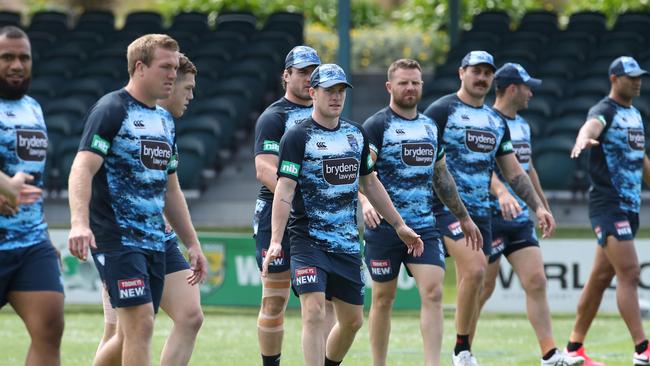
The questions are:
* Which state were you born in?
* In which state did you play rugby league for the majority of years from under-6s to under-18s?
* In which state of Australia did you spend the majority of years at school (kindergarten to year 12)?
* In which state did you first participate in a junior representative competition (Harold Matthews/SG Ball/Cyril Connell or Mal Meninga)?
* For which state of Australia did you first play school state representative rugby league? and;
* Did your father play State of Origin and, if so, for whom?
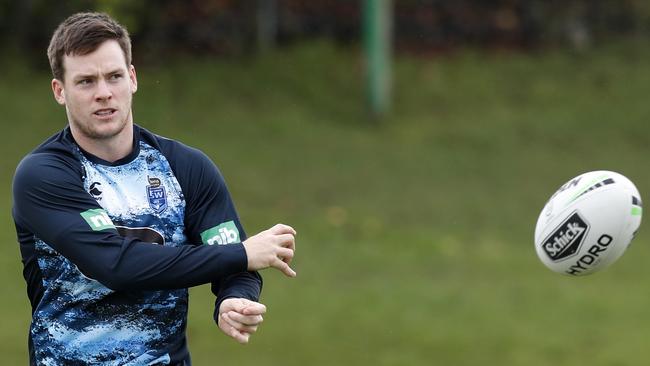
Keary answered 4-1 in favour of NSW. The final question was redundant as his father, who relocated the family to NSW when Keary was 10, had not played Origin.
But because he was born in Queensland, Keary formally attempted to be classified a Maroon.
In 2014, Keary met with then NRL head-of-football Greenberg to plead his case. He then ramped-up his efforts, seeking help from the Rugby League Players Association to compile a letter, sent to then CEO Dave Smith, asking to play for Queensland.
Keary’s application was rejected.
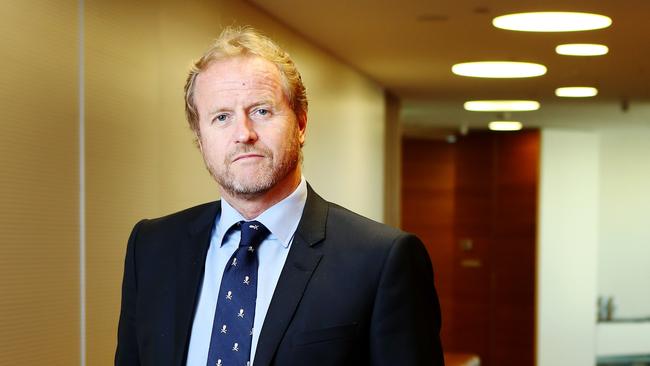
It will be fascinating to watch Keary conduct media interviews with NSW-based journalists this week. If they ask Keary who he supported as a kid, he will surely recount the words he gave to The Courier-Mail five years ago when he confirmed attending a Maroons junior camp.
“I went to a Queensland Emerging camp with Anthony Milford a few years ago,” Keary said in August 2015.
“Growing up, my whole family would get into Origin and we all supported the Broncos.
“We used to go to their old home ground all the time and watch the boys run around.
“I used to like watching Darren Lockyer and ‘Alfie’ Langer because Alf was from Ipswich, like myself.”
One of Queensland‘s greatest captains, Cameron Smith, said last year the notion of Keary wearing the Sky Blue jumper has left him bemused.
“I’m surprised with Keary,” Smith said. “I thought he was a Queenslander.
“The Keary issue is a tough one. There’s been debate for years about eligibility and what is the best rule.
“The Keary situation is a bit more problematic.
“Queensland are entitled to ask the question because he was in our system with the emerging squad.
“It’s hard to have a definitive rule on birthright.
“Ultimately, if Luke is happy to play for NSW, then let him wear the blue jumper. I believed he was a Queenslander, but NSW won’t let him slip away now.”
